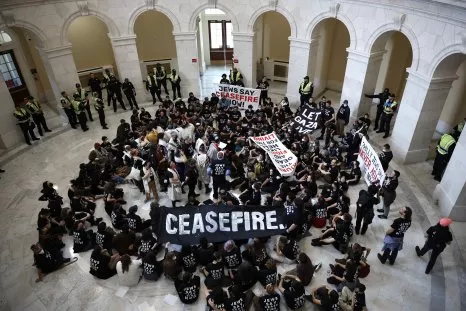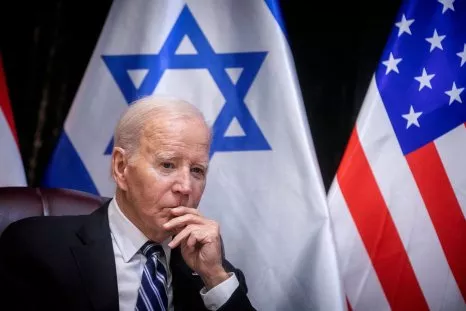Israel's Four Options for Gaza Shared by Former Netanyahu Adviser
Israeli troops are massing around the Gaza Strip as warplanes pummel the impoverished and besieged coastal region ahead of the fourth major Israel Defense Forces ground offensive into the area in less than 20 years.
This time, Israeli Prime Minister Benjamin Netanyahu has vowed that the IDF will wipe Hamas "off the face of the Earth." But Israeli officials have been less forthcoming on who or what will replace the Islamist militant group.
"There are four options," Yaakov Amidror, who served as Netanyahu's national security adviser from 2011 to 2013, told Newsweek in an interview, as the Israeli ground offensive looms. All paths, Amidror said, include a punishing Gaza campaign.
"I would even dare to say that no one would forgive the government if it will not be ended with a huge ground forces attack on Gaza," he explained.
Previous incursions into the Strip—sporadic since occupying Israeli forces withdrew from the area in 2005 amid the Oslo Accords peace talks—have produced significant casualties among Israeli troops, Palestinian militants and Gaza's 2.3 million civilians.
The unprecedented nature of Israel's airstrike campaign, underway since October 7, suggests this ground attack will be even more punishing for all those involved.
Gaza After Hamas
Netanyahu and his wartime coalition partners consider the brutal unfolding response to the killing of more than 1,400 Israelis—and the kidnapping of around 200 people—a political necessity in a country shocked by the worst terror attack in its short and violent history.
"Operation Swords of Iron," as the IDF has named its campaign, has already killed 3,478 people in Gaza, the Associated Press reported, citing figures from the Palestinian Health Ministry in Gaza. More than 12,000 have been wounded, 1,300 people are feared buried under rubble, and more than 1 million have been displaced.
The outcome of the imminent IDF invasion appears a foregone conclusion. The gulf between Israeli and Palestinian—meaning Hamas, Palestinian Islamic Jihad and a collection of smaller groups also expected to take up arms in the Strip—forces is stark.
Hamas, if it survives, will likely do so as a badly degraded force. Gaza—already a failing statelet after 15 years of Hamas rule and blockade by Israel and Egypt—will be left ravaged. With little apparent Israeli desire to re-establish a permanent military presence, the prospect of a dangerous power vacuum looms.
Newsweek has contacted a Hamas spokesperson by WhatsApp to request comment. An IDF spokesperson told Newsweek the force doesn't comment on its operational plans.
Renewed direct Israeli occupation, Amidror said, "will be a huge mistake, and I think that we should not do it. But it's an option." The next two alternatives, he added, involve bringing in outside powers, either Palestinian or as part of an international coalition.
The Palestinian Authority (PA)—led by President Mahmoud Abbas and dominated by his Fatah party—still holds nominal sway in the Israeli-occupied West Bank. Hamas' downfall could be an opportunity for the PA, Amidror said, to reverse the 2007 coup in which Hamas wrestled control of the Gaza Strip from Fatah.
"They expelled members of Fatah, they killed some of them, they pushed them from roofs, they shot them in the knees," Amidror said of the violent takeover, which came shortly after the 2006 Palestinian legislative elections in which Hamas emerged as the largest party. "Maybe there could be a chance for the Palestinian Authority to come in," he said.
But any effort by the Fatah-led PA to retake control will be complicated by continued support for Hamas among Gazan civilians, as well as the group's significant influence in the West Bank. A Washington Institute poll from July 2023 found that 57 percent of Gazans held a "somewhat positive" opinion of Hamas.
Foreign assistance, Amidror added, might also be a workable solution, though any international partners will face a high-risk environment.
"The third option is there will be any kind of international committee: money from the Gulf, experts from the West, and someone will take responsibility for going in and rebuilding, because it will be a devastating situation in Gaza," Amidror said.
'Not Israel's Business'
Perhaps the most likely outcome, the former national security adviser said, is that Israel will plan little of Gaza's future. But as the past two decades of intermittent violence have shown, Israel is unable or unwilling to leave the Strip to its own devices.
Though Israel left Gaza in 2005, it has retained tight control over Gaza's borders and coastline. This tightened further after the Israeli-Egyptian embargo came into force in 2007. Gaza relies on fuel and electricity supply from Israel, as do its three water desalinization plants.
Most food and agricultural imports also have to pass through Israel first and are subject to border crossing checks. Gaza's fishermen are only allowed to fish between 6 and 15 nautical miles from the shoreline, limiting what they can catch.
IDF boots no longer tread on Gazan ground, but Israel still very much controls the Strip and its 2.3 million residents.
"The fourth option is that it's not Israel's business," Amidror said. "Israel will finish the job, kill as many Hamas members as possible, destroy the facilities of Hamas and leave the Gaza Strip. And the people in Gaza will have to take care of themselves."
"We treat them as babies. No, it's 2 million people, it's their responsibility, and they have to materialize their responsibility. Israel will have only one commitment to the Gaza Strip; to destroy any attempt to rebuild any kind of military facility in Gaza, by anyone."
"It might be the result in the end that Israel will go out and no one will come," he added. "But it is not our business. We have been out of Gaza for more than 15 years. So, it is the responsibility of Egypt, of the world, of I don't know who. It's not ours."
"It will be a huge mistake for Israel to take responsibility for 2 million Palestinians in an area that we pulled all our forces and people out of 15 years ago," Amidror said. "It's an enemy and we should treat them as an enemy."
Disclaimer: The copyright of this article belongs to the original author. Reposting this article is solely for the purpose of information dissemination and does not constitute any investment advice. If there is any infringement, please contact us immediately. We will make corrections or deletions as necessary. Thank you.





